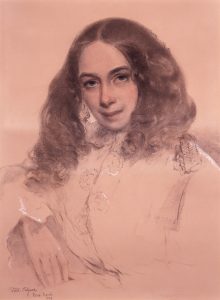Elizabeth Barrett Browning, E.B.B. (1806-1861)
Portrait of Elizabeth Barrett Browning by Field Talfourd, chalk, 1859, NPG 322, © National Portrait Gallery, London. Used with permission.
Elizabeth Barrett Browning (E.B.B.) was one of the most celebrated poets of her age, a candidate for poet laureate after the death of William Wordsworth.
She was born near Durham, the oldest of the eleven children, and was educated at home, near Ledbury. An avid reader and writer, she started writing an epic about Marathon at the age of 11 and had it privately printed when she turned 14. In 1821, she developed a debilitating spine disease. The family moved to London’s Wimpole Street in 1835.
In 1845, the prolific, but to most people opaque, poet Robert Browning wrote to thank her for praising his poems, and in turn expressed admiration for the “fresh strange music, the affluent language, the exquisite pathos and true new brave thought” of hers. Soon they were in love. E.B.B.’s father disapproved, but Elizabeth had a personal fortune, and in 1846 she and Robert left for Italy after a secret marriage. They settled in Casa Guidi, Florence, where her health improved, and in 1849 she gave birth to a son, Robert, known as Pen.
Many readers are familiar with her Sonnets from the Portuguese (1850), love poems to her husband Robert Browning, who called her ‘my little Portuguese’ because of her dark looks. In a letter she described herself as ‘“little & black” like Sappho … five feet one high … eyes of various colours as the sun shines … not much nose … but to make up for it, a mouth suitable to a larger personality’.[1]
While early reception of her work was dominated by Sonnets from the Portuguese, in recent years, scholarly attention has turned more toward Casa Guidi Windows and Aurora Leigh. The 1851 Casa Guidi Windows supported Italian reunification, and in 1856, E.B.B. published her verse novel Aurora Leigh, the first work in English by a woman writer in which the heroine herself is also an author.[1]
She died in Florence in 1861.
Text is a derivative of “Elizabeth Barrett Browning,” The British Library and is licensed under CC-BY-4.0.
- Norton Anthology of English Literature: The Victorian Age, 7th ed,. Vol. 2B, p. 1174. ↵


